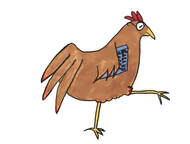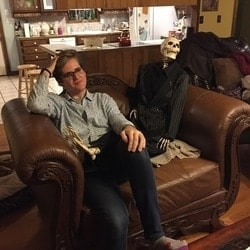Sacred Chickens
Menu
SACRED CHICKENS
 Today, Jarad is tackling the topic of diversity in literature, the canon, and what makes a book worthy of being canonized. What are the benefits of diverse reading and what can the publishing industry learn from that? We hope you enjoy his thoughts on the topic and happy reading! I was reading an excerpt from an article in my Feminist Theory textbook last semester. In it, the author talked about how, in college, she only read male authors, and she felt that she was forced to alter her perspective and view the world through a warped perspective, and she didn’t much care for it. I have to admit, my first reaction when I read that was one of irritation. Are we not supposed to see the world in different ways through literature, and are we not supposed to look through another person’s eyes in a novel? Yes, we are, but upon further reflection I don’t think that was her point. Her point was that she was forced to see only one kind of perspective, over and over again, and it was never a perspective that felt native to her. Every single time she read one of these books, she found herself looking through the eyes of a man. If you read enough classics (I talk about my middle school obsession with classics in another post, which you can check out here) they can get repetitive. The same point of view repeated, like a cadence that sometimes feels like the same story, same plot points. (Or the dreadful feeling of being trapped in Victorian England with weird oddly named characters who mumble and scream, that’s how it felt after the 4h or 5th Dickens novel. Yikes. Never, ever again.) I can see how this author felt that she trapped by the same perspective day after day. In some of my own classes, I have often found it difficult to slog through the classics, not because they are hard to read (with the exception of Melville. His, “adventure story,” put me to sleep), but because I felt like I had read it before. Don’t get me wrong, many of the classics remain dear to my cold, cold heart, but there are an equal number that I could do without. That was probably why this article stuck with me. Like me, the author was not seeing a diversity of perspective in the canon of literature she was reading. The boundaries of the canon felt like a wall that had been put in place to keep outlooks like her own from being heard and valued. The point of diversity is that everyone is represented, not just a select group of people. When a member of a marginalized group sees themselves in a work of literature (or tv or movies) that is a good thing, but it is also a good thing when someone outside that community sees this perspective, feels it through story, is able to empathize. In other words, diversity is vital and benefits everyone. And while it true that the authors of the canon are not as diverse as they could be, the authors that are there now oftentimes did not live diverse lives and did not see and understand a variety of perspectives, thus the suffocating similarity. When you, and indeed the section of society you live in, are not exposed to different kinds of people and ideas, your own ideas and ways of thinking can become homogeneous. I’ve heard many people say that great works of literature must have a character that they can identify with. The universality of a character, one that everyone sees themselves in, elevates that novel above the rest, they say. I saw echoes of that argument in the author’s article, but I don’t necessarily agree. I see the point she was trying to make, but when you apply that argument to the rest of literature, I think the idea of universality needs to be modified. For example, I reviewed a book some months ago called Homegoing by Yaa Gyasi (which you can read here), and it is a great work of literature in my mind. It takes the reader through many generations of a family that endures the horrors of slavery, and it explores generational trauma in a brilliant way I think. However, I don’t think everyone can identify in a specific way with the main characters. We of course can sympathize and empathize with them, and perhaps that’s what really makes a great work of literature, but characters are never completely universal in some ways. On the other hand, novels that respect the common humanity of their characters, even while seeking to understand the particularity of the context, those can lift us out of our small world views and cause us to ask what it means to be human. A novel that does that and educates people at the same time is most definitely deserving of being canonized. I’m not sure when the article I read was written, but I did find myself asking if that argument applied in modern literature and not just classic literature. Maybe it’s irrelevant, but I read more modern fiction than classics, so I think it’s a fair question to ask. And I find myself having a mixed reaction. I think those criticisms apply certainly to the publishing industry, but when you walk into a book store, you can find almost any kind of book you’re looking for. Certainly, you could say that the particular store you’re at doesn’t prioritize diversity of thought on their shelves, but as someone who goes to bookstores fairly often, I haven’t found that to be the case largely. There are small publishing houses devoted to making sure that diverse voices are heard. Maybe the problem isn’t that we don’t have a diverse set of viewpoints on the author side, maybe the issue is more that authors who don’t fit a certain profile aren’t valued by agents, publishing houses and the media. We don’t automatically hear about these books. As a reader, you have a certain amount of power to rectify this problem. Go out and look for stories that will stretch your imagination, that will let you feel what it’s like to walk in someone else’s shoes. Stories that will make you rethink your own experience as the default human experience. They are out there. And maybe, just maybe, if we do some of the footwork ourselves, the publishing industry, the reviewers who want so badly to define literary taste, will have to follow us this time.  Jarad is the co-administrator and writer for Sacred Chickens, attends college at MTSU, loves tea and coffee, and tries to spend every spare second reading. He recently developed an interest (some might say obsession) with gardening. Jarad is an English major with a concentration in literature. Bless his heart! Let's all light a candle for him and send him happy thoughts!
0 Comments
Leave a Reply. |

Click Photo above to buy ebook or paperback from Amazon.
Here's the link to Barnes and Noble Or order through your favorite independent bookstore! Categories
All
|
 RSS Feed
RSS Feed